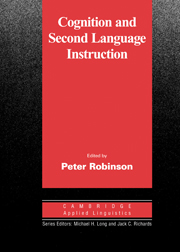Book contents
- Frontmatter
- Contents
- Series editors' preface
- Preface
- SECTION I THEORETICAL ISSUES
- SECTION II COGNITION AND INSTRUCTION
- 7 Cognition and tasks
- 8 Cognitive underpinnings of focus on form
- 9 Intentional and incidental second language vocabulary learning: a reappraisal of elaboration, rehearsal and automaticity
- 10 Task complexity, cognitive resources, and syllabus design: a triadic framework for examining task influences on SLA
- 11 Aptitude, individual differences, and instructional design
- 12 Cognition, instruction and protocol analysis
- References
- Index
8 - Cognitive underpinnings of focus on form
Published online by Cambridge University Press: 05 October 2012
- Frontmatter
- Contents
- Series editors' preface
- Preface
- SECTION I THEORETICAL ISSUES
- SECTION II COGNITION AND INSTRUCTION
- 7 Cognition and tasks
- 8 Cognitive underpinnings of focus on form
- 9 Intentional and incidental second language vocabulary learning: a reappraisal of elaboration, rehearsal and automaticity
- 10 Task complexity, cognitive resources, and syllabus design: a triadic framework for examining task influences on SLA
- 11 Aptitude, individual differences, and instructional design
- 12 Cognition, instruction and protocol analysis
- References
- Index
Summary
Introduction
The purpose of this chapter is to examine focus on form in cognitive processing terms by postulating plausible, psychologically real, cognitive correlates for a range of L2 learning processes that have become prevalent in the instructed second language acquisition (SLA) literature. Progress in adult SLA is thought often to depend crucially upon cognitive processes such as paying attention to features of target input, noticing interlocutor reactions to interlanguage (IL) output, and making insightful comparisons involving differences between input and output utterance details. To be effective, these cognitive comparisons must be carried out under certain conditions of processing meaning, forms, and function, i.e., conditions which promote processing for language learning. Whereas pedagogically oriented discussions of issues – such as noticing the gap and L2 processing – abound, psycholinguistically motivated rationales for pedagogical recommendations are still rare.
Focus on form is proposed as an instructional expedient for addressing pervasive, systematic, remediable or persistent L2 learning problems (Long, 1991); for instance, pervasiveness and systematicity as evidenced in emerged L2 developmental errors, persistence as evidenced in the less-than-targetlike production of advanced immersion learners (Doughty & Williams, 1998b; Long, 1991; Long & Robinson, 1998), and remediability in the sense of not fundamentally determined by immutable acquisition processes (Long, 1991; Pienemann, 1989). Such pedagogical intervention is claimed to be more effective and efficient than would be leaving learners to their own devices to solve these L2 problems (Doughty & Williams, 1998b).
- Type
- Chapter
- Information
- Cognition and Second Language Instruction , pp. 206 - 257Publisher: Cambridge University PressPrint publication year: 2001
- 217
- Cited by

